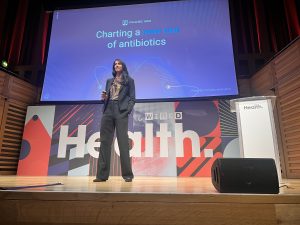From here, Phare Bio and the Collins’ lab at MIT struck up a partnership. They initially received funding from The Audacious Project—a TED-housed initiative that helps companies tackle the world’s most pressing needs. On top of this, the company was recently awarded up to $27 million from The Advanced Research Projects Agency for Health—a similar funding agency that supports transformative health and biomedical breakthroughs.
WIRED Health 2025: AI Start-up Showcase Winners

The annual WIRED Health event promises to deliver the most exciting updates to the healthcare world, and this year was no exception. On the 18th of March 2025, leading experts in the field –scientists, doctors, and entrepreneurs alike– came together from across the globe to the city of London (UK) with one united goal: to spark discussions on the rapidly changing healthcare landscape.
To wrap up the WIRED Health 2025 event, this year’s start-up winner Phare Bio presented their novel AI solution, seamlessly tying into the day’s opening AMR discussion with Dame Sally Davies.
Pharmaceutical Companies Can’t Keep Up with Bacteria
Akhila Kosaraju led the presentation, firstly acknowledging the breadth of the crisis: “Half of all hospital infections are antibiotic-resistant,” she says.
She then highlights a major challenge for researchers, noting that superbugs are currently outpacing traditional drug development pipelines:
“It takes less than 6 years to acquire resistance to an antibiotic, and it takes 12 years to develop a new antibiotic.”
What’s more, the pharmaceutical industry is shying away from creating new antibiotics in favor of more profitable therapeutic areas, such as chronic conditions with longer treatment timeframes. Instead, biopharma companies are combining old antibiotics into new regimens —a much cheaper strategy— rather than tackling the problem directly.
Because of this, innovation in the field is stifled, drying up the antimicrobial pipeline.
“We are losing the battle against resistance more and more every single day. We’re developing recombinations of existing antibiotics and not going after what’s really needed: novel mechanisms of action—novel classes of antibiotics that bacteria haven’t gotten smart enough to evade yet.”
Phare Bio: Injecting Innovation into Antibiotic Discovery
With bacteria outcompeting scientists in the race against AMR, researchers are desperately trying to find new ways to innovate antibiotic development—finding more effective drugs in a much shorter timeframe.
Phare Bio aims to do exactly that, having sprung into action after the first AI-powered antibiotic discovery from the MIT Collins’ lab in 2020. Akhila reflects on this breakthrough, describing it as something that “energized a field that wasn’t getting much attention.”

Introducing AIBiotics
Currently, the company is building its tech solution, AIBiotics, the world’s first generative AI antibiotics discovery engine that screens 1000x as many molecules, 5x faster, with a 100x greater success rate. Using this, they hope to tackle the “valley of death”—a biotechnology phenomenon where most drugs fail preclinical development due to either lack of funding or scientific effect.
Akhila outlines the company’s aim of developing 15 novel classes of antibiotics over the next five years, calling the initiative “ambitious” but “totally solvable,” thanks to the powerful technology they are using. She explains the rationale behind this goal, pointing to numerous studies that suggest 15 new antibiotics would be sufficient to target resistant strains across all antibiotics.
She concludes the talk:
“Using AI, we can turn the clock of resistance forward, increasing the amount of time it takes to develop resistance while cutting the time to develop a new antibiotic. We can finally outpace these extraordinarily evasive superbugs.”





